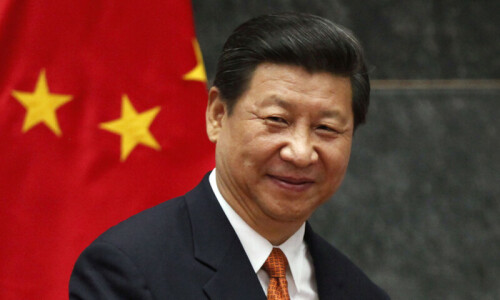• Slimmer SC bench to take up matter of Punjab, KP poll delay today
• Four judges leave bench; Justices Afridi, Minallah stick to stance on maintainability, Justices Ahsan, Naqvi bow out ‘amid allegations’
ISLAMABAD: After deliberations in an anteroom that lasted around ninety minutes, Chief Justice Umar Ata Bandial in a surprise move on Monday, split a larger bench into a five-member bench to conduct suo motu proceedings on a delay in elections to the Punjab and Khyber Pakhtunkhwa assemblies.
Earlier, a nine-judge bench — visibly polarised at its first hearing — was scheduled to commence the hearing at 11:30am, but proceedings eventually resumed at 1:30pm after the reconstitution of the bench.
The Supreme Court also issued a written order, which was dictated in the open court on Feb 23 when Justice Jamal Khan Mandokhail objected to the initiation of the proceedings under Article 184(3). The CJP also hinted that they would like to conclude the matter by Tuesday (today) and closed Monday’s proceedings around 5:25pm.
Signed by nine judges, the written order of the bench stated that keeping in view the Feb 23 order, the additional notes attached by four judges, the CJP’s direction to add questions raised by Justice Syed Mansoor Ali Shah, Justice Yahya Afridi, Justice Jamal Khan Mandokhail and Justice Athar Minallah, as well as discussions/deliberations made in the anteroom of the apex court, the matter was referred back to the top judge.
In response, the CJP reconstituted the bench comprising himself, Justice Shah, Justice Munib Akhtar, Justice Mandokhail, and Justice Muhammad Ali Mazhar. Those who dissociated themselves from the hearing include Justice Ijazul Ahsan, Justice Afridi, Justice Sayyed Mazahar Ali Akbar Naqvi, and Justice Minallah.
During the hearing, Attorney General Shehzad Ata Elahi cited Article 254 and said the elections in the two provinces cannot be held before May 2 because the deadline to hold the elections within 90 days has lapsed.
As per Article 254, failure to comply with the requirement as to time does not render an act invalid.
‘Trivial matters’
At the outset when the court commenced the hearing, Justice Bandial observed that four judges graciously disassociated themselves from the bench to avoid wasting time on trivial matters, so that the case could proceed strictly in accordance with the Constitution.
The CJP also regretted that scurrilous allegations have been hurled, but two members said they would not sit on the bench whereas two judges expressed their opinion on the maintainability of the case. About Justice Mandokhail’s note, the CJP regretted that the note was forwarded before the court order was signed and uploaded on the website.
Justice Shah opposed to recusal
In his additional note, Justice Shah mentioned the controversy in the public domain generated by the audio leaks relating to one of the members of the bench and, despite requests from within and outside the court, he noted there had been no institutional response to the allegations by this court or by the constitutional forum of the Supreme Judicial Council (SJC). Furthermore, there is news of references being filed against the member before SJC by the bar councils.
In this background and before these allegations could be probed into and put to rest, inclusion of the member on the bench in the present matter of public importance appears inappropriate and this inclusion becomes more nuanced when other senior judges were not included on the bench, Justice Shah observed.
Justice Shah observed that the court’s impartiality, including the public perception of transparency and openness in dispensing justice, must at all times be undisputed and beyond reproach. In the absence of any lawful justification, Justice Shah observed, mere recusal from the bench may amount to abdication of the constitutional and legal duty, therefore he would not recuse himself.
Judicially ‘inappropriate’
Justice Yahya Afridi observed it would not be judicially appropriate to exercise the power under Article 184(3) to make an order given that the matters raised in the petitions before the court were also pending adjudication at the Lahore and Peshawar high courts.
The jurisdiction of the apex court under Article 184(3) is an independent original jurisdiction that is not affected by the pendency of any matter on the same subject matter before any other court or forum, Justice Afridi said, adding the decision already rendered by LHC and the peculiarly charged and unflinching contested political stances taken by the parties, warrant the Supreme Court to show judicial restraint to bolster the principle of propriety.
This is to avoid any adverse reflection on apex court’s judicial pre-emptive eagerness to decide, he observed.
Therefore, passing any finding or remarks during the proceeding of the present petitions by this court would not only prejudice the contested claims of the parties in the cases before high courts but more importantly, offend the hierarchical judicial domain of the high court as envisaged under the constitution.
‘Order not consistent’
Justice Minallah regretted that the written order does not appear to be consistent with the proceedings held on Feb 23 and the order dictated in the open court and that the questions raised before the court cannot be considered in isolation.
He added that questions regarding the constitutional legality of the dissolution of the provincial assemblies of Punjab and Khyber Pakhtunkhwa cannot be ignored.
Were the assemblies dissolved in violation of the scheme and principles of constitutional democracy before completion of the term prescribed under the Constitution, Justice Minallah observed and added that the questions regarding the legality of the dissolution involve far more serious violations of fundamental rights. The matter before us, Justice Minallah observed, definitely was premature, because it was pending before a constitutional court of a province.
Justice Minallah said he was of the opinion that it was implicit in the language of Article 184(3) that the conferred extraordinary original jurisdiction must be entertained and heard by the full court.
Published in Dawn, February 28th, 2023














































